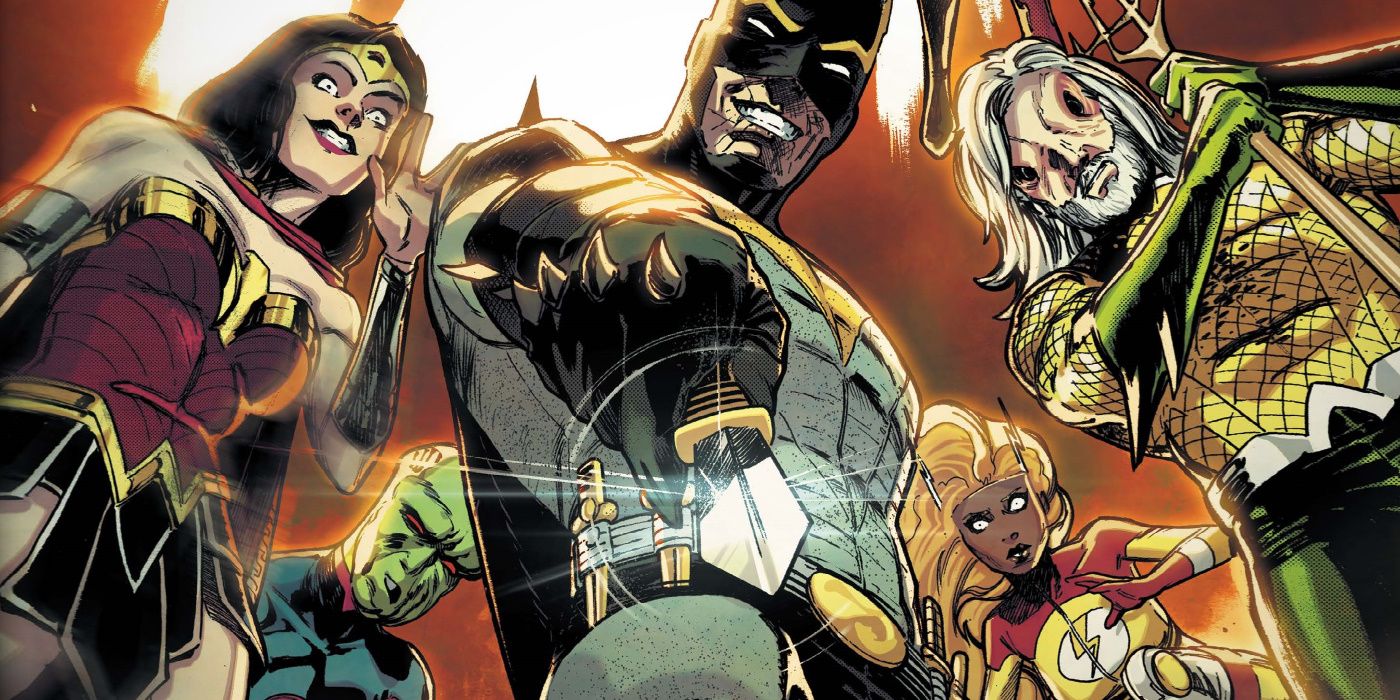
The launch of DC's Future State has already brought new and ambitious re-imaginings of the publisher's core characters. But after learning just what is in store with the Future State versions the Suicide Squad and a millenia-old Black Adam, there's no question some of the biggest surprises for readers are still on the way.
In addition to a new version of Batman or wild glimpses of DC's possible futures, the conclusion of Death Metal also brought with it the return of parallel worlds and realities many believed to be erased, or at least overlooked, from the DC Multiverse. It's those worlds that have been chosen for DC's Future State: Suicide Squad #1 arriving January 26th. With a new version of Task Force X taking a mission to Earth-3, followed by Black Adam's own mission in the 853 Century in the same issue, the stage is set for two major twists. Screen Rant got the chance to speak with new Suicide Squad writer Robbie Thompson and Jeremy Adams about both unexpected tales. The full interview, as well as a preview of both stories contained in Future State: Suicide Squad #1 can be found below.
Screen Rant: So with Death Metal setting up a new status quo, the shift from that finale into Future State obviously happened faster for readers than for you guys. Can each of you speak to the process of how you joined Future State, and landed on these particular characters, and inside the same book? I'm assuming you didn't need to be talked into an event like this.
Robbie Thompson: I was working on Teen Titans, and this was a long time ago. Usually in comics, your runway is about 20 feet, so it was quite a while back. I'm not sure when you go brought in, Jeremy, but I felt like we got a lot of time which we don't normally get. Was that your experience as well?
Jeremy Adams: No, my experience was that I was brought in under the umbrella of 5G. Then that all fell apart. I had never written a comic, and that's always been on my bucket list since I was a little child. So I thought, "Oh, it was so close. And yet again, it has crumbled before me." Then a couple months ago, my friend Tim, who's writing Teen Titans now in the Shazam Future State, mentioned me to our editor Mike Cotton. Cotton asked, "What about these guys?" And Tim's like, "Oh, Jeremy is great." So, Cotton called me up and said, "Hey, would you like to do something with Black Adam in Future State?" And I'm like, "Okay, what's that?" I really didn't have much time.
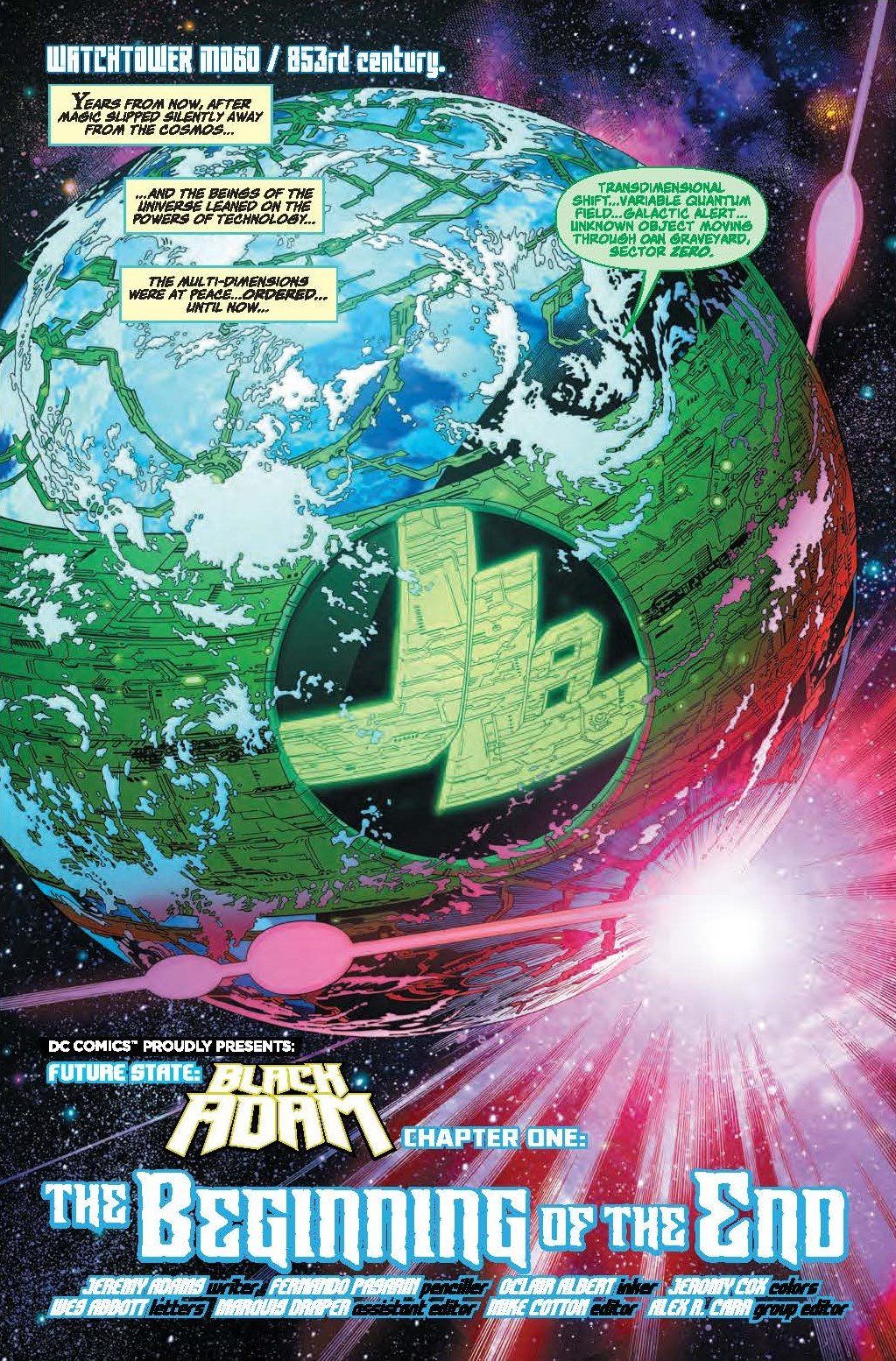
The advantage I had compared to a lot of the people in Future State is that mine is so far removed in the future to the DC One Million segment that I didn't need that much run-up, other than trying to make sense of DC One Million. Which I loved, but it's crazy. Cotton, very cleverly, is trying to weave some overarching story between the Future State titles that he's editing - which I think is very good. So, having to try to figure out how to put that into what I was doing was really fun. But I didn't have a lot of lead up.
Robbie Thompson: I guess we had somewhat similar experiences in that, although I was not involved in the artist formerly known as 5G, there was definitely a sense that I got of, "Okay, here's this big event, and here's how we can be interconnected. Here's how we can tell stories that can stand on their own," which was another big appeal to me.
I also knew I was going to be writing the Suicide Squad ongoing book, so that that was really helpful too. Because Cotton and [Assistant Editor Marquis] Draper both had a very clear idea what they wanted for that book, which made forward reverse-engineering Future State a little bit easier on my part. Just to finish the thought, I was working on Teen Titans and my job was to come in and land that plane. That's that's what I did, and that was fun. I figured, "Okay, my time at DC is done. I'm wrapped. I never got to write Ambush Bug, but it was a good time." But then Cotton reached out and was like, "Hey, what are your thoughts on the Suicide Squad?"
I was a big fan up to Tom Taylor's recent run with that crew, so I'm like, "What did you have in mind?" I'm from TV, so it's always great when editors are like showrunners and have a clear vision of what they want; it makes the job a lot easier and a lot more fun. To have a little bit more time than usual was also cool. It's not that we haven't burned through that time or changed some stuff, but to have the luxury of that was very cool.
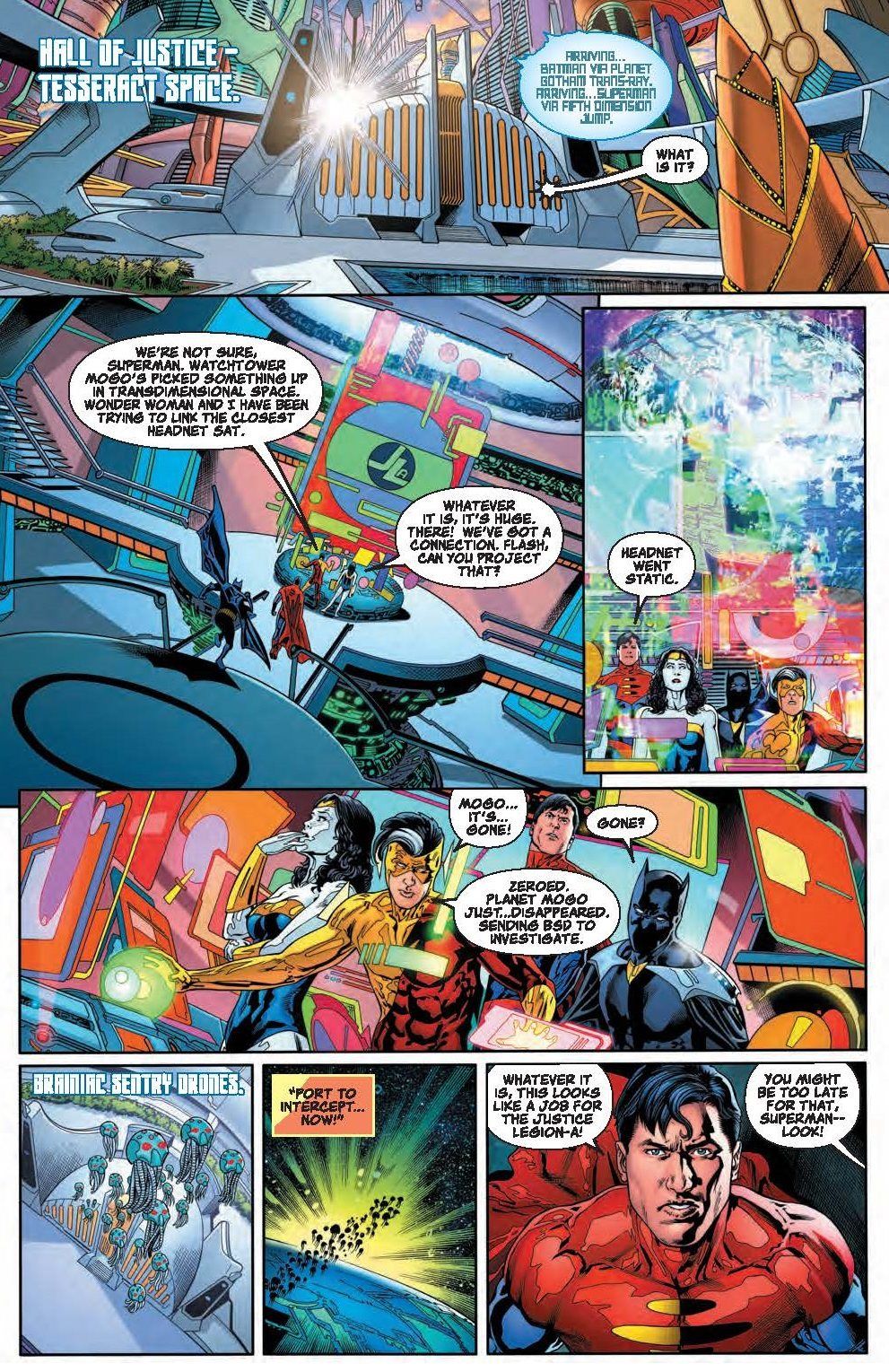
SR: Death Metal opened the door for revisiting previous worlds and realities and storylines. For you, Robbie, that means a return to Earth 3. And for Jeremy, it's a trip it's a trip through time to DC One Million. Can you both set the stage for these return trips, if it will be the same version fans know, and what it was you found appealing about these corners of DC lore?
Jeremy Adams: For me, it's the Black Adam of it. When you read DC One Million, which is so far flung in the future, one of the things that I noticed was that there was a lack of discussion of magic. And I think that was kind of the thread I started pulling at when you're talking about Black Adam and who would that character be. Why is there no real discussion of magic, and what does that look like? Kind of hinting at what could have happened to magic, but also using that as a catalyst to get us into a bigger threat that is going to play a critical role, especially in Teen Titans Future State.
I thought that, to a degree, I had one of the easier jobs because I could be so far in the future. I don't know if I'm spoiling anything, but in one of the panels in the background, you can see Etrigan, except he has a Detective Chimp hat. I didn't have any brakes put on me, in terms of the things I could do or not do. The fact is that the DC One Million just afforded me an opportunity to play with that, and go into that world. When I first read it, I was kind of like, "I don't know..." and then I reread it and I'm like, "This is awesome!" It's really strange and out there, but it has a really great ending. To be able to play something in that time, and then try to trace it back to what might have happened in some of the other books, was really fun.
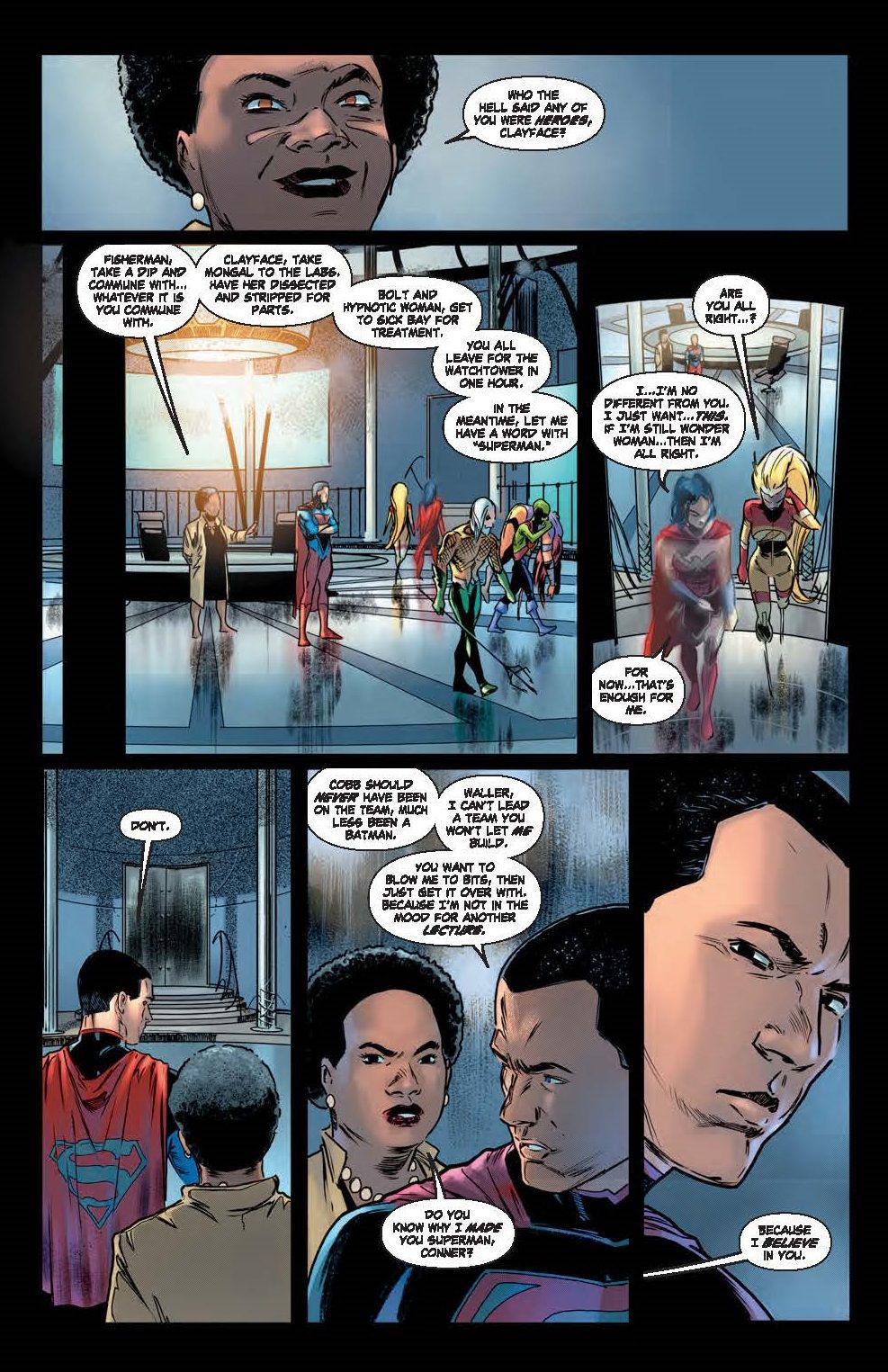
Robbie Thompson: I would say I had a similar experience, in terms of the worlds that's opened up. Earth-3 is fun and everything but, I think for me, it was more about what Cotton and the crew wanted to do with Amanda Waller. I think she's always been such an amazing character. She's both the protagonist and the antagonist of the story. And where they wanted to take her was eventually to Earth-3, which is sort of a bit of a cautionary tale. If she gets what she wants in the ongoing series, it's curtains for us. But it was really more about exploring what drives Amanda Waller.
In Future State, we see what she's doing. And then in the series, I guess, we kind of unpack why she's doing it. We're seeing her trying to do something different after having done the sort of the same for a while. And we're exploring what that breaking point was for her, and why she wants to try something different. That, coupled with the addition of Superboy to the team - he's in the Future State books, and the two-parter is centered around him and Waller. He's introduced very quickly in the ongoing story, and I was just really excited about that character.
We have a bit of a mystery with him - I don't know how much I'm allowed to say - in terms of where he's going and why he's there, but it dovetails a little bit with Walter's story. You'll see it hinted at in Future State issue 2. I was excited Earth-3 and I love the crime syndicate and all that other stuff. But, really, it was about exploring what Waller is up to, and it was kind of a means to that end. She's a means to an end kind of a character, so it felt like it fit pretty nicely.
Jeremy Adams: It's such a good high concept too, Robbie.
Robbie Thompson: I blame Cotton; it's all his fault.
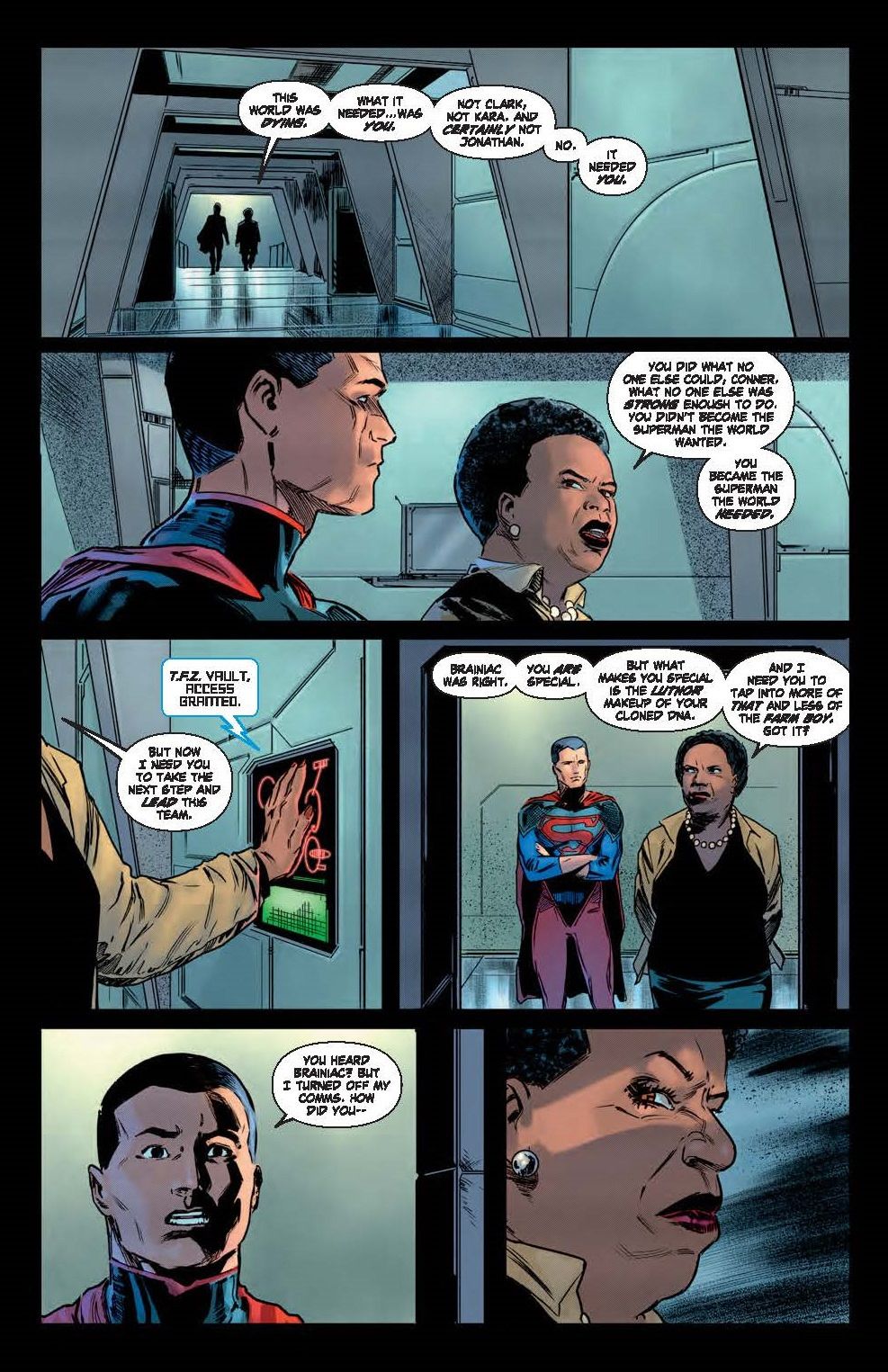
SR: Despite the name of the book being The Suicide Squad, you're getting to assemble three teams in play at this point. The first page will pleasantly surprise people when they open the book to meet the Justice Squad, which has been glimpsed in some preview pages. You have assembled a motley crew out of some hilarious deep cuts that are guaranteed to send fans searching DC Wikis.
Robbie Thompson: Again, I have to credit Cotton and Draper, the editors on the book. When we first started talking about the book again, we initially were talking about the ongoing Suicide Squad book. There were a lot of pieces that they wanted to play around with. But the thing that was appealing to me, and I think it's the appeal of the great Suicide Squad runs that I've enjoyed, is the motley crew of both familiar faces and obscure faces. To spoil a little bit in the new series, we'll be introducing some new characters. I wouldn't get attached. I mean, it is the Suicide Squad. I literally will put that in the script. I'll be like, "Don't get attached. Two pages later. the neck bomb's going off."
But, yeah, we wanted to kind of play around you know with what a Bizarro Justice League would look like. What would it look like if Waller was assembling ostensibly her own version of the Justice League, with her squad bent on it? It led to some larger iconic characters, like Conner Kent now being Superman. But then we were like, "Okay, who's our Flash? Who's Wonder Woman..." and that led to some really just fun and frankly weird shit, getting Talon as Batman and Clayface as the Martian Manhunter.
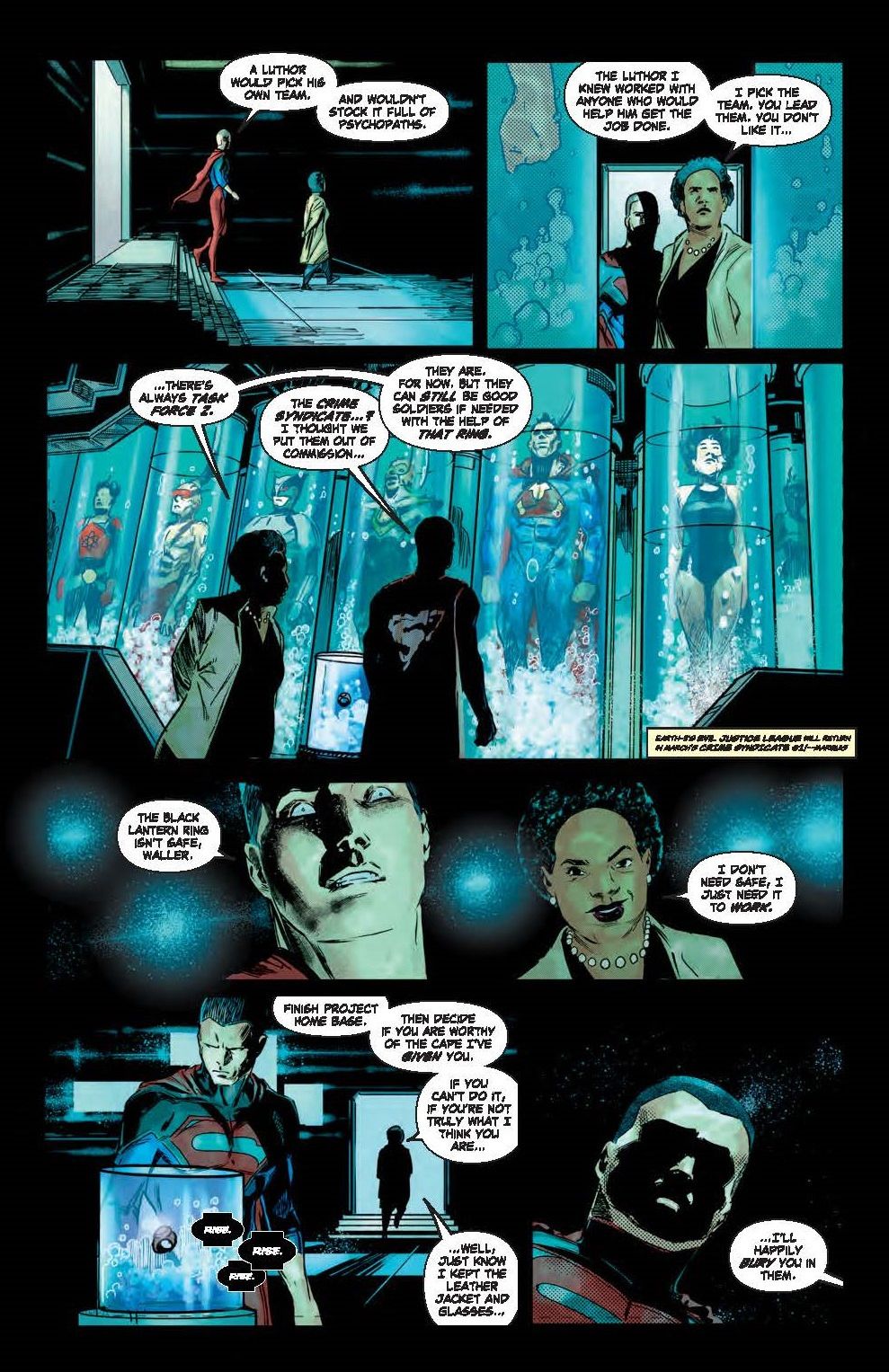
To Jeremy's point earlier, because Cotton is weaving a bunch of these things together, we do have the futuristic version of a new Teen Titan character that will be introduced in Tim's book. It's definitely a weird group of people. I think this is in the preview pages, but much like any Suicide Squad or anything with Waller attached, I wouldn't get attached to any of these people. Pretty quickly, you see a pretty iconic character go right out the window. But that's been our MO: how do we keep this true to those classic Ostrander stories that are character-driven, but with characters that are obscure and weird and that you end up caring about? Then, of course, their heads blow up and that's the great paradigm of a book like this.
The Justice Squad is definitely a motley crew. But, like you said, we're gonna meet a couple of others. I think I'm allowed to tease stuff. If this is the new Task Force X, there's also hinting at a Task Force Z. What powers that, I think, is a cool mystery for fans. And then, of course, our last page is the Squad itself. It's always fun to build teams, but on Suicide Squad, it's even more fun to break them down - sometimes literally. The two-page spread that introduces the Squad is really just another piece of fantastic storytelling from Javier Fernandez, who's the artist on the book.
SR: A special treat is that Peacemaker is playing a major role here. He's getting a ton of buzz right now, thanks to James Gunn's Suicide Squad sequel, but you have the cool honor of introducing him to a lot of fans. Where does your Peacemaker fit in this battle of bad versus evil?
Robbie Thompson: I think the great thing about Peacemaker is in his first line: "peace at any cost," or whatever, I'm blanking on the exact phrasing. He is such a delightfully arch character in that regard. And he's such a fun contrast, especially in the later years where he got even more rigorous and how he wanted to find peace. So, I think the thing that's fun about him is that he's not really interested in good or evil; he's interested in peace. He doesn't really care who gets in his way, as you'll see in the story, and this is the story that we're gonna be telling long term with Peacemaker.
He is at odds with Amanda Waller. As you'll see in the ongoing series, he's a willing member of the Suicide Squad - as much as you can be. At least that's what he's telling himself. In terms of placing where he's at, I think what we hint at in the story is that he was working for Waller and was a believer and what she was doing, and she has gone a step too far even for Peacemaker. Waller is kind of off the rails. But what I think is great about both characters is they both can be protagonists and antagonists. They both genuinely feel that what they're doing is not only the right thing, but the good thing. In their minds, they have justified their actions to meet that questionable morality.
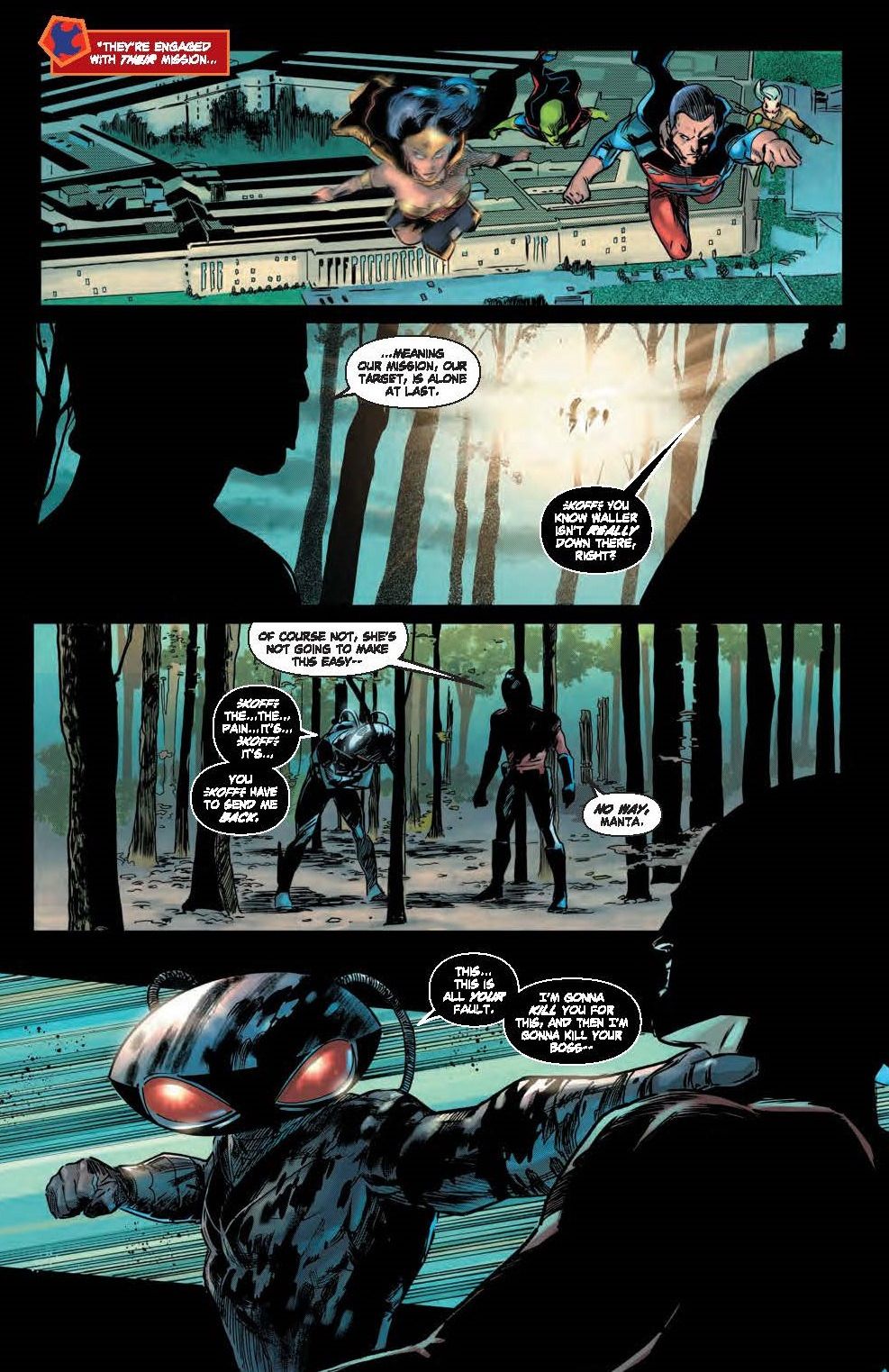
Yes, he's a buzzy character, because he's going to be in the movie and they're doing a TV show. And it's John Cena playing him, which is amazing. I love that guy. But it was really about finding a fun, opposite number for Waller. They're two people that might seemingly be on the same page, but then what would tear them apart? That's sort of where you're seeing Peacemaker at the beginning of this; he is none too pleased with Waller.
SR: That actually is a fantastic segue for you, Jeremy. Fans of Shazam don't need to be told how far Black Adam would climb if he was given a few hundred centuries. For that very reason, the Adam they meet in this story is not the one that they're going to expect. What led you in that direction of subverting his reputation?
Jeremy Adams: I think because Adam's trajectory from being the chosen champion of the wizard Shazam, and then that power going through his head so he becomes this kind of antihero, feels like a hollow pursuit. I think what makes him interesting is when he finally found Kahndaq, and he's like, "I have a people, and I have a mission to protect." This has extended out into the universe now, but he gives up that iron fist, and it's more about Kahndaq being a place of refuge. He mirrors that, and he's kind of stepped away when we meet him from that life of being a warrior; of being somebody that fought for things. He's almost gone the other extreme, into kind of pacifism.
And he's lived for hundreds of years. There's this perspective he has on what actually means something. That's kind of where our story moves a little bit. What would it take for somebody that's seen it all to keep wanting to live? And that's where we meet him. What brings that fire back that makes him want to fight again? Because that's not where he is when we meet him.
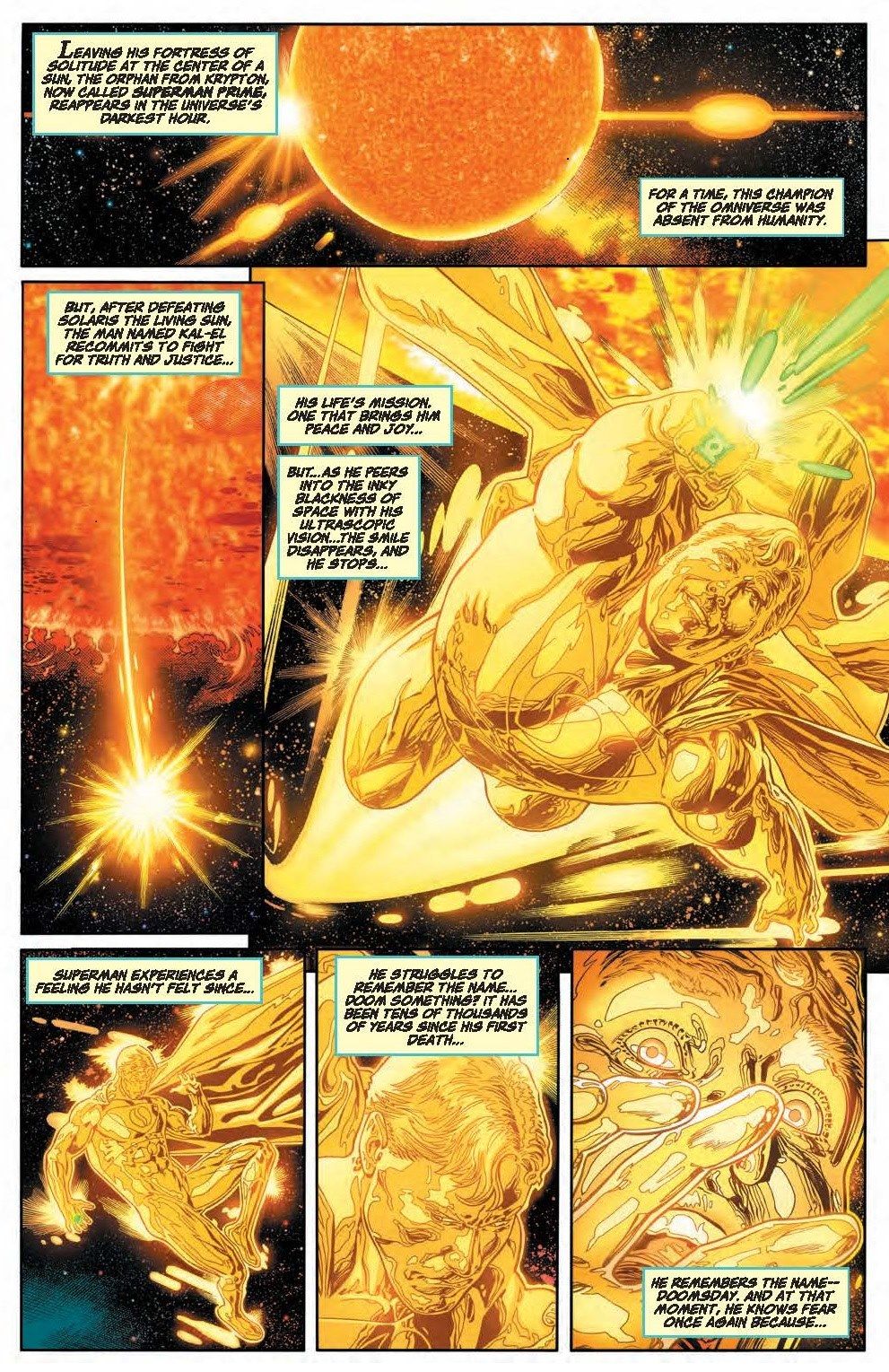
SR: What are your hopes for this tale? I feel like this is a very different story than people would expect from Future State Black Adam.
Jeremy Adams: Yeah. I'm in awe of many different things: the fact that they let us create some characters, which has been an absolute joy - particularly one character that I got to help create that is my favorite person ever. Also, taking something from my animation work and being able to put it into the DC proper has been really great too, and seeing how that character will have far-reaching effects in other books.
But this is my first time out as a comic writer, and I'm still learning the ropes. Mostly, when I see Fernando Pasarin's art, I'm like, "Why are we splitting it with words? This is stupid. We need to strip out all the words, and just put this incredible art there." Because he really captures the emotion and the humor and some of the insanity of it. But I think because it was my first attempt at a comic, and it was also me thinking it could be my last attempt at a comic, I'm gonna just throw the kitchen sink at it. I think it's really fun, and even the second one doubles down on the craziness of it. But I like that kind of unrestrained imagination, where I can keep putting ideas out.
Robbie Thompson: I did the same thing when I was at Marvel, I think it was issue 4 of Silk. Because I was like, "Oh, we'll get cancelled at 5." Right? But I put the Fantastic Four and Galactus in it, and there was no reason for either to be in the book. I thought, "This is it. This is my chance. It's the fourth issue."
Jeremy Adams: That's what I did when I got on Supernatural, because I knew it was the last season. "Here's a bunch of ideas!" And they're like, "No."
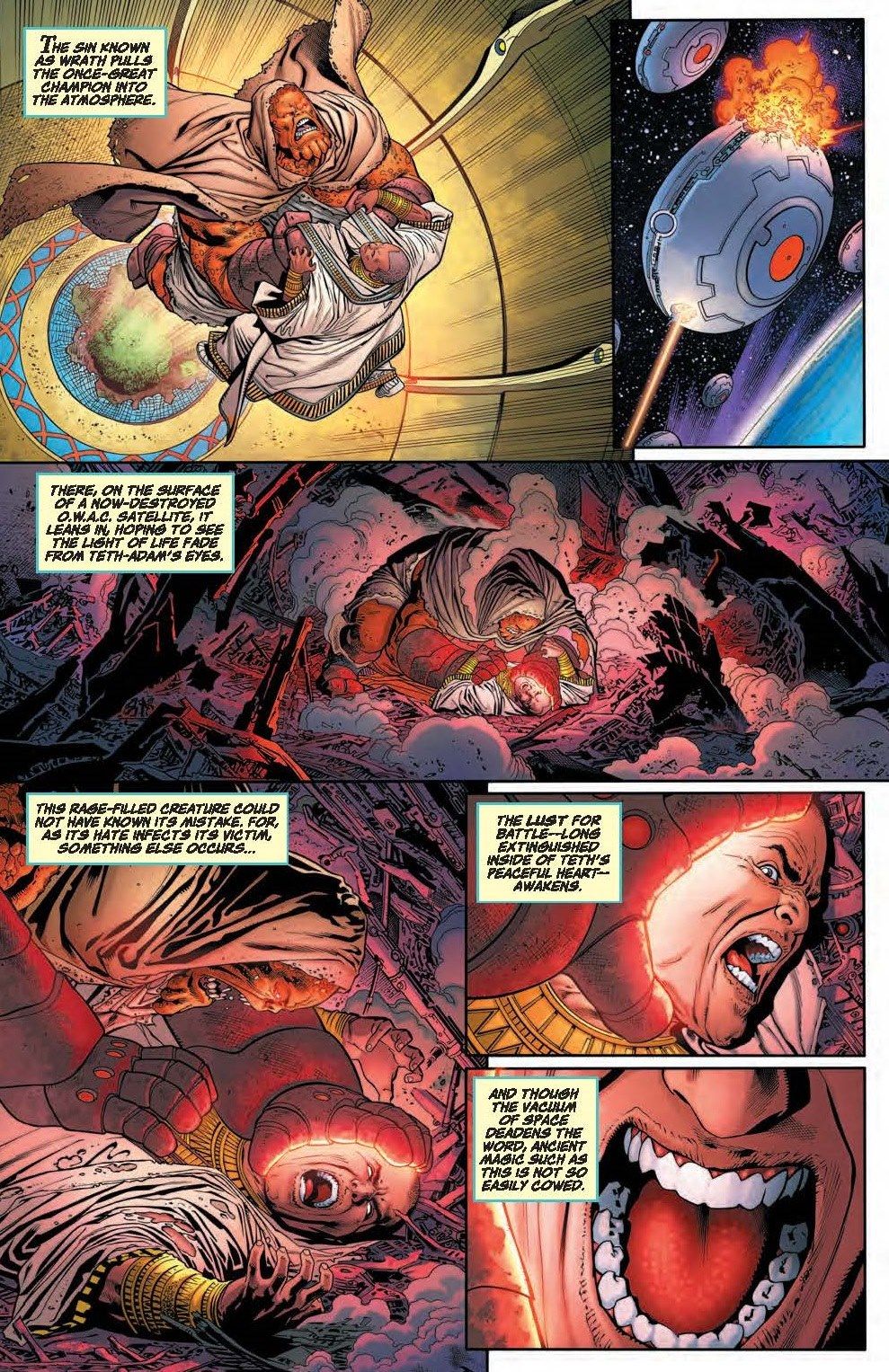
SR: You both are giving readers a lot to talk about with, with more than one headline-worthy twist or reveal or development. Are you prepared to see how fans react to those bombshells?
Jeremy Adams: Robbie and I have been through the crucible that is Supernatural. So, sans expectation, I'm just like, "Alright, whatever." That's not why I do it. I do it because I want to tell that story. I want to be crazy or zany or whatever. Because I'm a fan, so I write toward my inner fan.
Robbie Thompson: I mean, you're always going to have - on characters that people are so attached to, or teams that people are so attached to, or content - you're always going to have something. It's almost a fool's errand to chase it. Becaus when you do chase after the shiny thing, it's the thing that you never thought - it turns out they love this over here, and they're obsessed with that detail.
I certainly hope that people talk about it. As one of my first editors said, "It's only when they're not talking about your book that you're in trouble." I certainly hope they do, but I wouldn't say it was the intention. I really can say that on every book I've ever worked on, there's always the thing that I felt like, "Oh, this will get their tongues waggin'." And then no, it was actually this thing over here. It was this relationship that people got really invested in, that was for me just a means to a plot end, but for them it was the conduit into the book or the story or whatever. So, yeah, I certainly hope they get chatting.
SR: In that vein, can each of you speak a bit about the art teams responsible for this future cosplay? They more than deliver right from the start, and it's hard to imagine them elevating it from here.
Robbie Thompson: I'm really bare bones in my scripts. I'll just say, "This is a new version of Batman; it's Talon. Have fun?" I'm dressed like a failed lumberjack; I'm not the guy for that. Fortunately on Future State, I'm working with Javier and Eduardo on the ongoing. They're just briilliant artists. Javier took all of the ideas that we were talking about in the book and really just made his own take on all these characters. And then Alex came in with his colors and did an amazing job, and everybody just came to play in their own way. If people end up cosplaying as Talon Batman or this creepy Martian Manhunter, it's all thanks to Javier and his design work. I don't know about you, Jeremy, but seeing those new designs come in every single time is always so exciting and really fun.
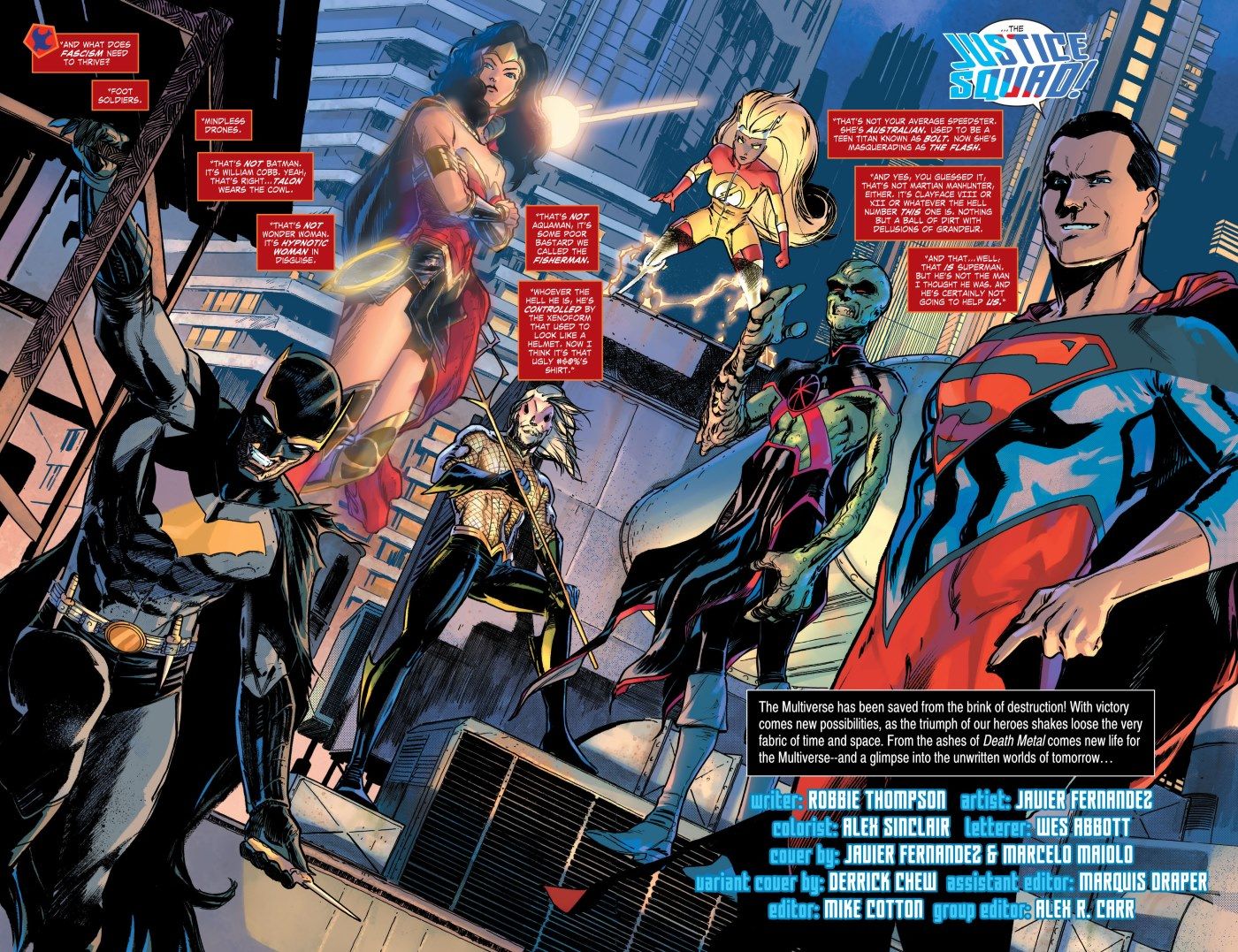
Jeremy Adams: Yeah, I was a little overwhelmed by it all. Because in animation, you write something and then you got to wait a couple years before you actually get to see it. But when it comes to this, it's almost like live theater a little bit. You have a very quick reaction that you get, because these geniuses that are artists and colorist and inkers come in, and give you this magic from the little words you scribble down. I probably am a little more descriptive in certain things, just because of the byproduct of animation in general. But the fact is that everything that I had in my mind, Fernando did it times 10. It was just so detailed and so interesting. Even the coloring and the inking; everything was just so perfect.
It's a weird thing for me, because you get the pencils back and you're like, "Can we just release this? This is so good." Then you get the inks back, and you're like, "Well, this is great!" And then you get the colors back, and you feel like, "Well, I don't know why I'm here." That's kind of how I feel the entire time.
Future State: Suicide Squad #1 will be available at comic book shops and digitally on February 26th, 2020.
- Future State: Suicide Squad #1
- Written by: Robbie Thompson, Jeremy Adams
- Art by: Javier Fernandez, Fernando Pasarin, Alex Sinclair, Oclair Albert, Jeromy Cox
- Cover Art by: Javier Fernandez, Marcelo MaioloDerrick Chew
- Editor: Mike Cotton,
- SUICIDE SQUAD, PART 1 / BLACK ADAM, PART 1
- The Suicide Squad enters the Future State era as Amanda Waller uses Task Force X to save the world and remake it in her image—but what happens when the team shows up to stop her? And in the second story in this extra-sized issue, Black Adam, the immortal one-time champion of the wizard Shazam, rules the planet Kahndaq in the 853rd century. Can he save the future from a threat rooted in the past?
https://ift.tt/39VxoSC
January 23, 2021 at 05:43AM




